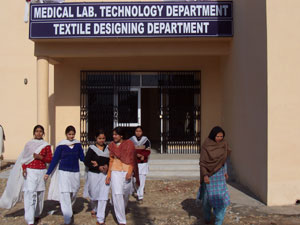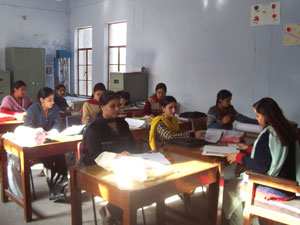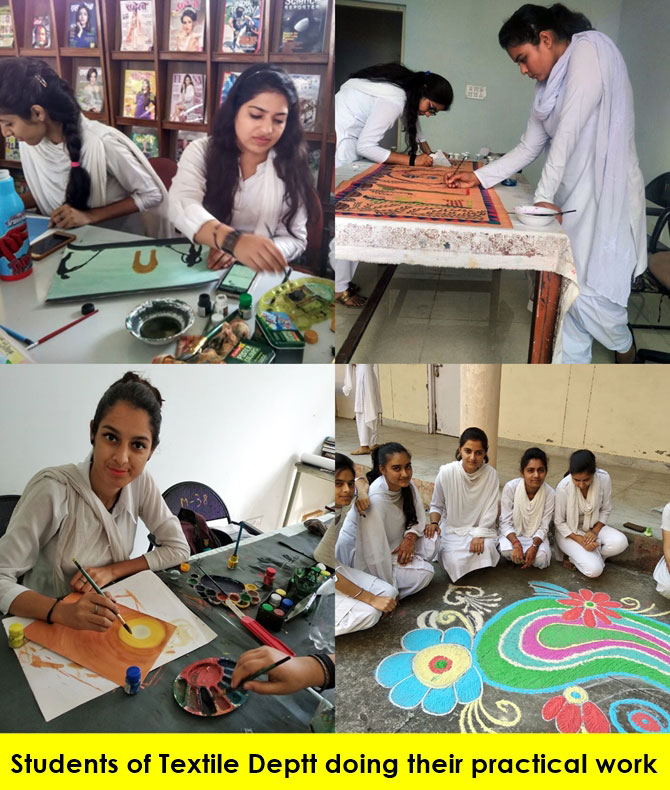Department of Textile Designing
The Textile Designing Department is also the newly established department under the World Bank Project. The department started in 2004. The department offers quality education in the field of Textile Designing and serves the Textile Industry, Innovative educational experiences through continuous learning and growth and mentoring students to the new word of Textile Designing.
The labs available in the Textile Designing Department are:
1. Computer / CAD Lab
2. Textile Testing Lab.
3. Dyeing & Printing Lab
4. Weaving Lab



Salient Features of the Diploma Programme in Textile Designing
| Name of the Programme | Diploma programme in Textile Designing |
| Duration of the Programme | Three years |
| Entry Qualification | Matriculation or as prescribed by Board of Technical Education, J&K |
| Intake | 15 |
| Pattern of the Programme | Semester System |
Ratio between theory and Practice |
40:60 |
| Industrial Training | |
| Distribution of Marks | |
| Ecology and Environment | As per directives of Government of India, an awareness camp on Ecology and Environment has been incorporated during second semester |
| Entrepreneurship Development | An Entrepreneurial Awareness Camp and a full subject of Entrepreneurship Development and Management has been incorporated in the scheme |
| Industrial Exposure | The students will be exposed to industrial environment by organising industrial visits and expert lectures by personnel from industry. The suggested industry oriented-practice based minor and major projects will enable the students to interact with relevant industries. |
| Student Centred Activities | A provision of 3-4 hrs per week has been made for organizing Student Centred Activities for overall personality development of students. Such activities will comprise of co-curricular activities like extension lectures, library studies, games, hobby clubs e.g. photography, painting, singing, seminars, declamation contests, educational field visits, N.C.C., NSS, Cultural Activities, Civil Defence/Disaster Management activities etc. |
Employment Opportunities for Diploma Holders in Textile Designing
- In various sections of textile mills such as Spinning/Weaving/Processing, Textile Design, Knitting, Production, Sales, Maintenance etc.
- In textile mills to check/test the standards and quality of fibre, yarn, fabric, and garments as per specifications
- In defence, handlooms and handicrafts, textile committee/ corporations, export houses, garment houses and similar undertakings dealing with textiles, woolen mills, carpet industry.
- In research and development organizations engaged in the field of textiles
- In textile machinery manufacturers/auxiliaries for erection and installation, sales and service
- In textile laboratories
- In technical institutes
- Self-employment (in establishing weaving units; carpet weaving industry, dying units, handloom or power loom, printing units etc. and providing consultancy to textile industries).
Competency Profile of Diploma Holders in Textile Designing
- Competency to analyze and evaluate the performance of different fibres, yarns and fabrics
- Basic understanding of the processes involved in converting fibres into yarns and yarn into fabric
- Knowledge of characteristics of fibres, yarns and fabrics
- Ability to manufacture and develop different types of yarns and fabrics
- Ability to test the quality of raw materials and product at every stage of operation in textile processing and knowledge of material handling operations
- Ability to develop textile design for weaving and their execution
- Working knowledge of chemical and mechanical processing of textile
- Working knowledge and associated skills to operate machines and their maintenance.
- Knowledge of safety operations in textile industry.
- Knowledge of production planning layout; productivity; costing, estimating and profitability; control and management
- Ability to prepare, read and interpret drawings pertaining to textile machinery
- Communication and interpersonal skills for effective functioning at work places
- Learning to learn skills and ability to solve practical problems in relation to production; quality control; repair and maintenance; management of men, material and machine etc.
- Appreciation of environment, conservation of energy, safety, entrepreneurship support system, basic principles of management and labour welfare
- Computer applications in textiles
Lower Shiv Nagar (Near AG's Office), Jammu - J&K Phone: ++91-191 2955320 & +91-191 2957937
E-mail: gpfwjammu@gmail.com & gpfwj@rediffmail.com
AICTE Approvals | Downloads | Grievance
